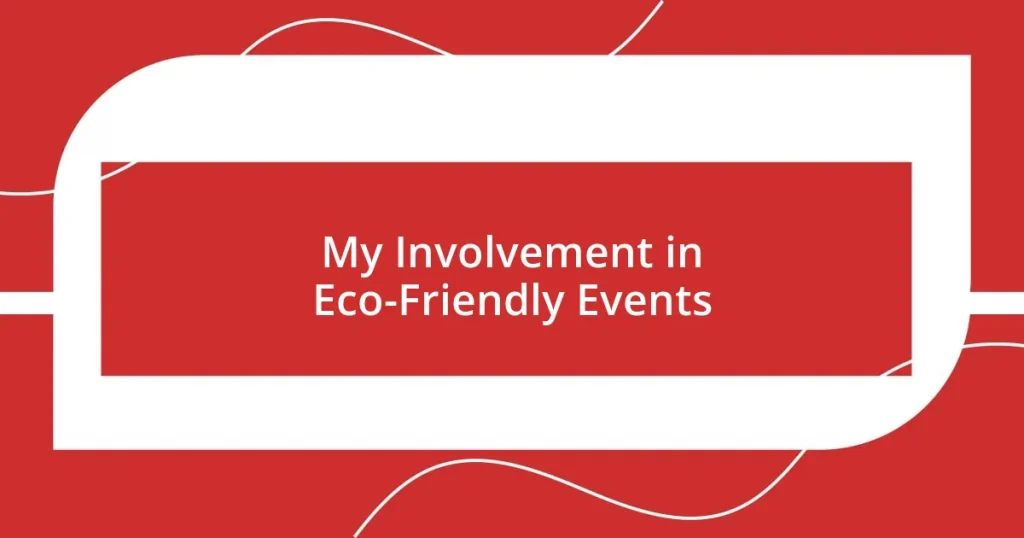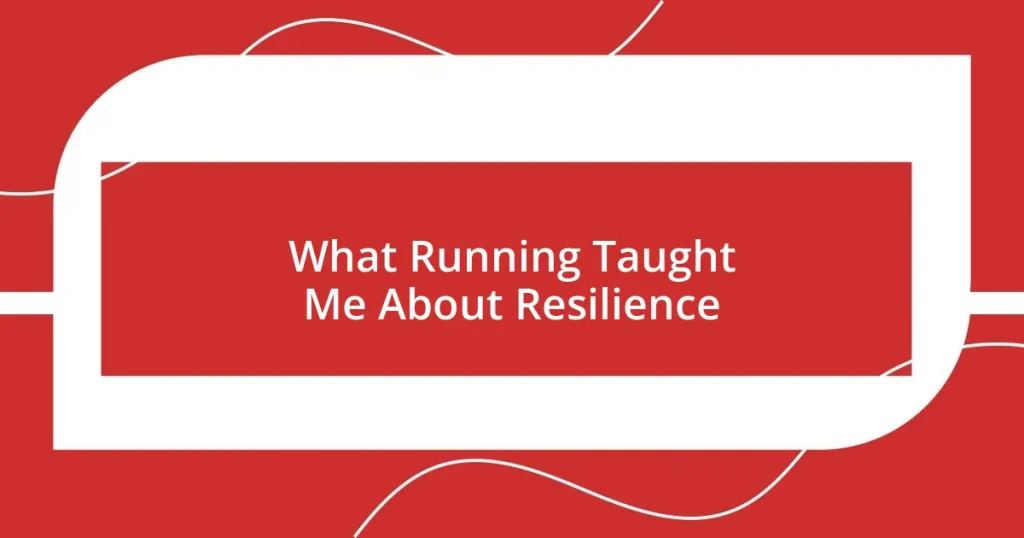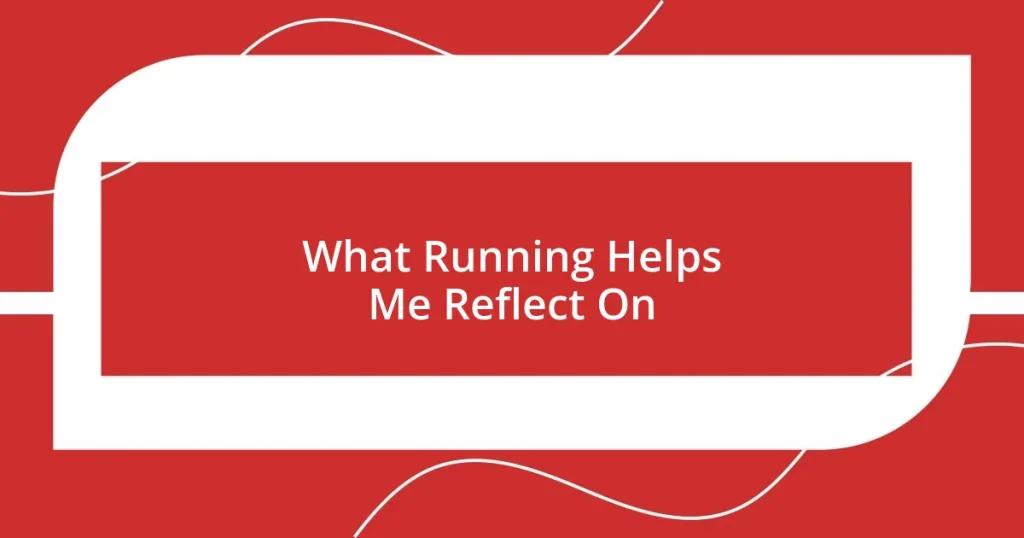Key takeaways:
- Eco-friendly events foster community engagement and discussions about sustainability, creating lasting memories and inspiring collective action.
- Simple eco-friendly practices, like using digital tickets and compostable materials, can reduce waste and save costs, encouraging critical thinking about resource usage.
- Collaboration with local organizations enhances the impact of events, bringing diverse ideas and resources that strengthen community bonds and promote environmental awareness.
- Promoting sustainability through thoughtful planning and programming, such as digital invitations and informative speakers, can inspire attendees to adopt eco-friendly practices beyond the event.
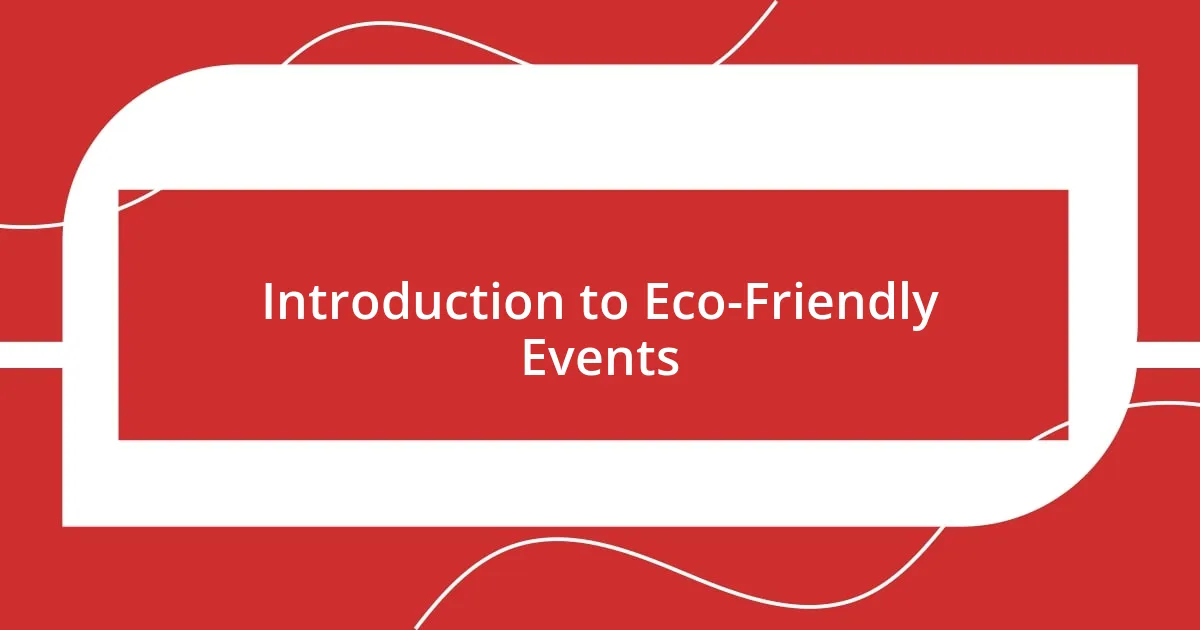
Introduction to Eco-Friendly Events
Eco-friendly events are more than just gatherings; they represent a commitment to sustainability and a step towards preserving our planet. I remember my first experience attending an eco-festival, where every detail—from biodegradable utensils to locally sourced foods—made me feel part of something bigger. It’s incredible how collective passion can turn an event into a catalyst for change.
Have you ever thought about what goes into organizing an event that respects the environment? I was amazed to learn about the multitude of choices that make events eco-friendly, such as using renewable energy or encouraging participants to carpool. Each decision reflects an understanding of our environmental impact, making attendees feel value in both participation and responsibility.
Engaging in eco-friendly events opens up a dialogue about sustainability in our everyday lives. When I saw participants actively discussing ways to decrease waste while enjoying a vibrant atmosphere, it truly struck me how these gatherings not only provide fun but also foster important discussions. It’s heartening to witness people bonding over their shared commitment to environmental health, creating lasting memories that resonate far beyond the event itself.
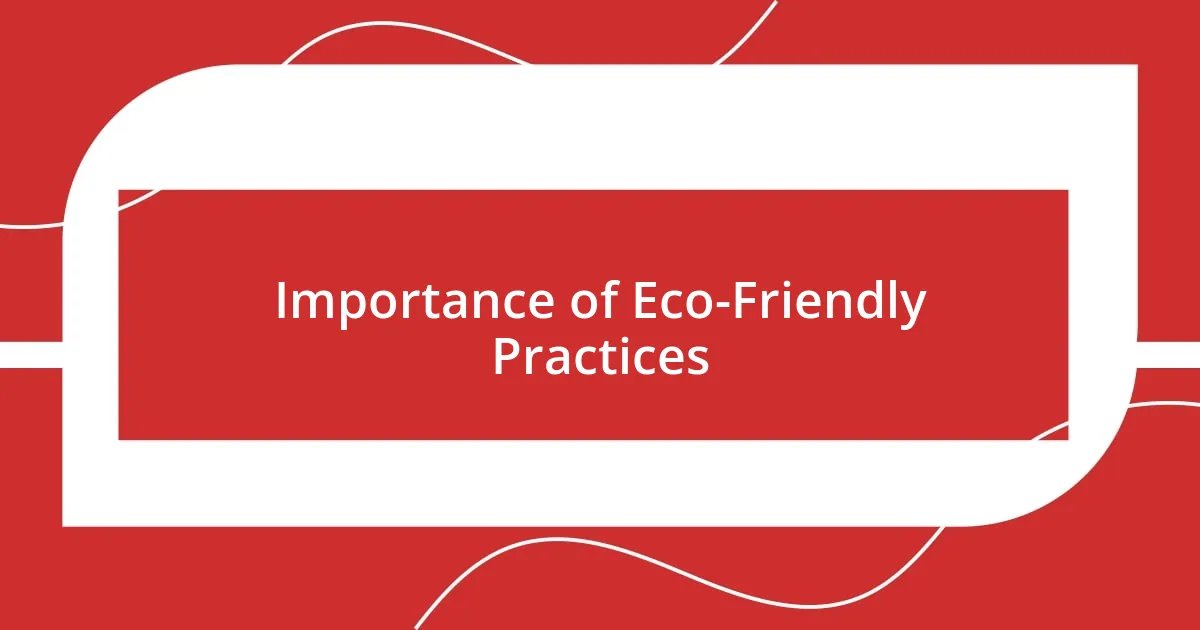
Importance of Eco-Friendly Practices
Understanding the significance of eco-friendly practices in event planning is crucial. When I volunteered at a community cleanup event, I realized how simple choices, like using compostable materials, can significantly reduce waste while encouraging others to adopt similar habits. Observing people’s reactions when they saw the positive impact of their actions truly highlighted how individual efforts can contribute to a larger environmental purpose.
Moreover, eco-friendly practices often lead to cost savings that can be reinvested for further development. At one festival, the event organizers opted for digital tickets, saving both paper and money. I found it remarkable how these small changes fostered a culture of sustainability, encouraging attendees to think critically about the resources they use every day. It was fascinating to witness firsthand how something as simple as going paperless can spark excitement and innovation.
These practices reinforce a sense of community and shared responsibility. During a recent plant-based cooking workshop, participants exchanged ideas about sustainable living. The atmosphere was filled with enthusiasm, as we each contributed to an inspiring dialogue about nourishing both our bodies and the planet. It was a vivid reminder of how eco-friendly events can ignite passion and a collective drive for sustainable habits that extend well beyond the occasion.
| Eco-Friendly Practices | Traditional Practices |
|---|---|
| Reduced Waste | Increased Waste |
| Lower Costs | Higher Costs |
| Community Engagement | Lack of Community Focus |
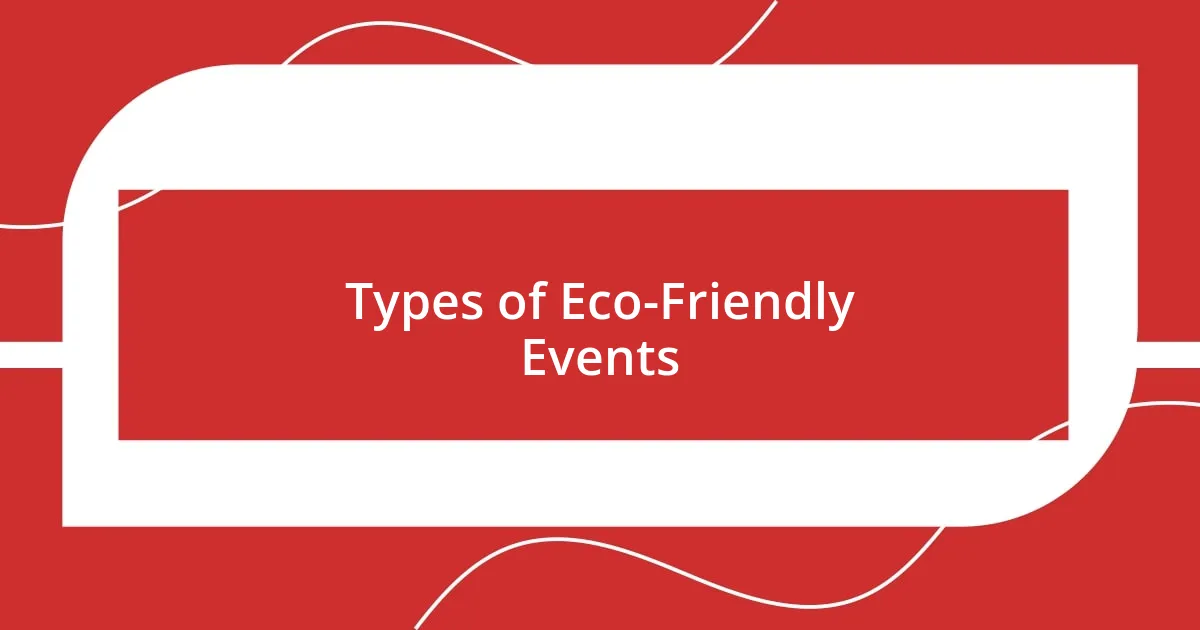
Types of Eco-Friendly Events
Engaging with eco-friendly events has introduced me to a variety of formats that champion sustainability. For instance, I’ve participated in community gardens, where locals come together to grow organic produce. The sense of camaraderie among participants is palpable, and I cherish how we’ve cultivated not just plants but also friendships that flourish over shared goals. Events like clean-up initiatives and tree-planting drives also stand out because they uniquely highlight direct action for environmental improvement. Witnessing the transformation of a neglected area into a vibrant green space truly stirred my emotions.
Here are some popular types of eco-friendly events I’ve come across:
- Eco-Festivals: These vibrant celebrations feature local vendors, workshops, and entertainment focused on sustainable living.
- Community Clean-Ups: Engaging locals to help clean parks or beaches, these events foster community spirit while addressing litter issues.
- Tree Planting Drives: These initiatives encourage people to plant trees in their neighborhoods, promoting reforestation and biodiversity.
- Sustainable Workshops: From upcycling to organic gardening, these educational events equip participants with practical skills for sustainable living.
- Farmers’ Markets: By supporting local growers, these markets emphasize seasonal produce and reduce carbon footprints associated with transporting goods.
Every type of event resonates with a sense of purpose, turning simple gatherings into instrumental movements for environmental change. Each experience reminds me of the significant impact we can collectively make!
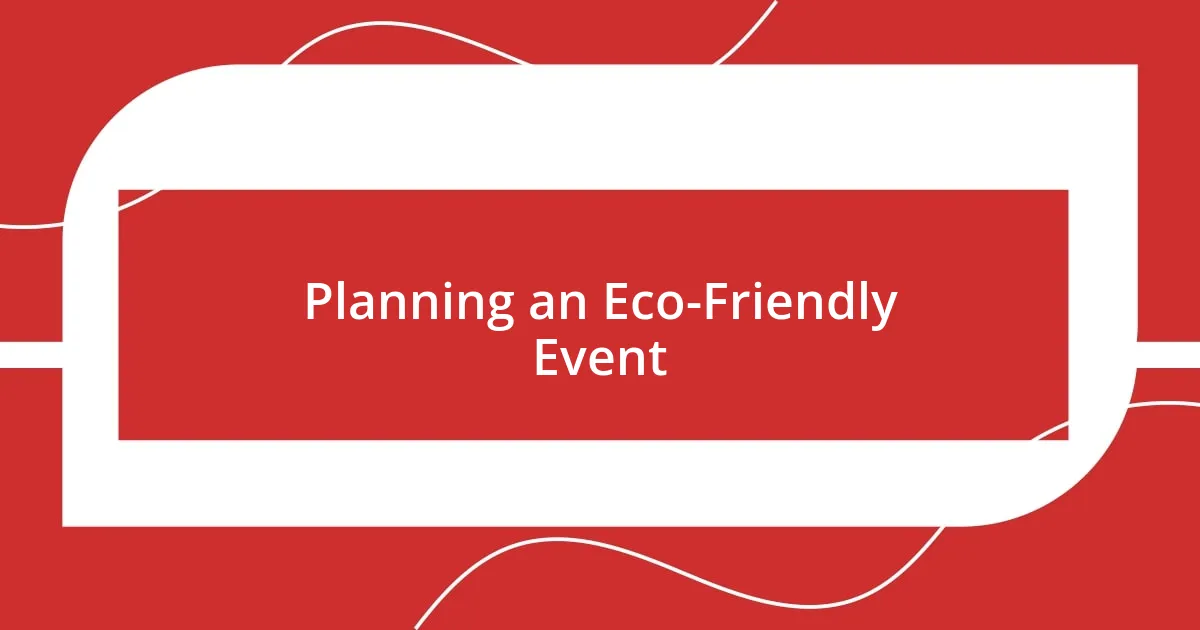
Planning an Eco-Friendly Event
When I took on the challenge of organizing an eco-friendly event, I quickly learned that every detail matters. For instance, selecting a venue that prioritizes sustainability practices, like using energy-efficient lighting and water conservation techniques, offered a robust platform for our vision. I remember chatting with a venue manager who shared how simple changes improved their carbon footprint, and it was enlightening to realize the ripple effect of such choices.
As I navigated the planning process, I discovered the benefits of incorporating local and seasonal catering. At one event, I teamed up with a nearby farm that provided fresh produce, which not only delighted our guests but also supported the local economy. Seeing attendees savoring the flavors of freshly sourced ingredients was a joy I won’t forget. Don’t we all appreciate a meal that’s not just delicious but also has a story behind it?
Promotion also plays a vital role in eco-friendly events. I chose to share our plans through social media platforms and local community boards, focusing on the elements that aligned with sustainability. It was gratifying to witness how easily we sparked interest and discussion among potential attendees. Who knew that sharing our eco-conscious intentions would ignite such a positive buzz in the community? It reaffirmed my belief that when we highlight our commitment to the planet, it encourages others to engage and reflect on their own practices.
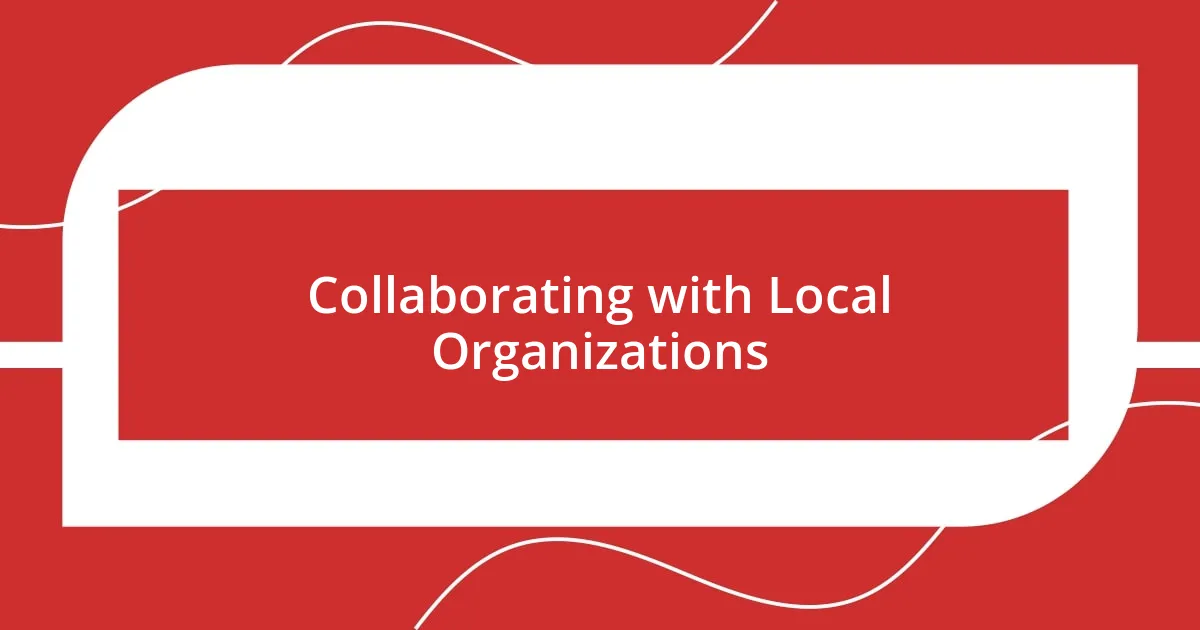
Collaborating with Local Organizations
Collaborating with local organizations has been a transformative experience for me in my journey with eco-friendly events. One memorable partnership was with a local environmental NGO that organized monthly clean-up campaigns. I still remember the thrill of working shoulder to shoulder with enthusiastic volunteers, all of us excitedly discussing our shared love for the environment. It wasn’t just about picking up trash; it was a collective experience that strengthened our community bonds and underscored our commitment to a cleaner planet.
In another instance, teaming up with a local university for a sustainability fair opened my eyes to the power of networking. Students brought fresh ideas and energy, and their passion for innovation was contagious. During one brainstorming session, a student proposed an interactive workshop on composting, and I couldn’t help but feel a rush of excitement at the prospect of learning something new from them. Who would have thought that collaborating across generations could spark such inspiring dialogue about sustainable practices?
When I think about the lasting impact of these collaborations, I realize they create a synergy that amplifies our efforts. Each organization brings unique strengths to the table, which enriches the overall experience. For example, partnering with a local farmer’s market allowed us to promote both local produce and sustainable living simultaneously. Seeing participants excitedly share tips on how to integrate fresh ingredients into their diets was nothing short of heartwarming. Isn’t it fascinating how working together fosters not just environmental awareness but also a deeper connection among community members?
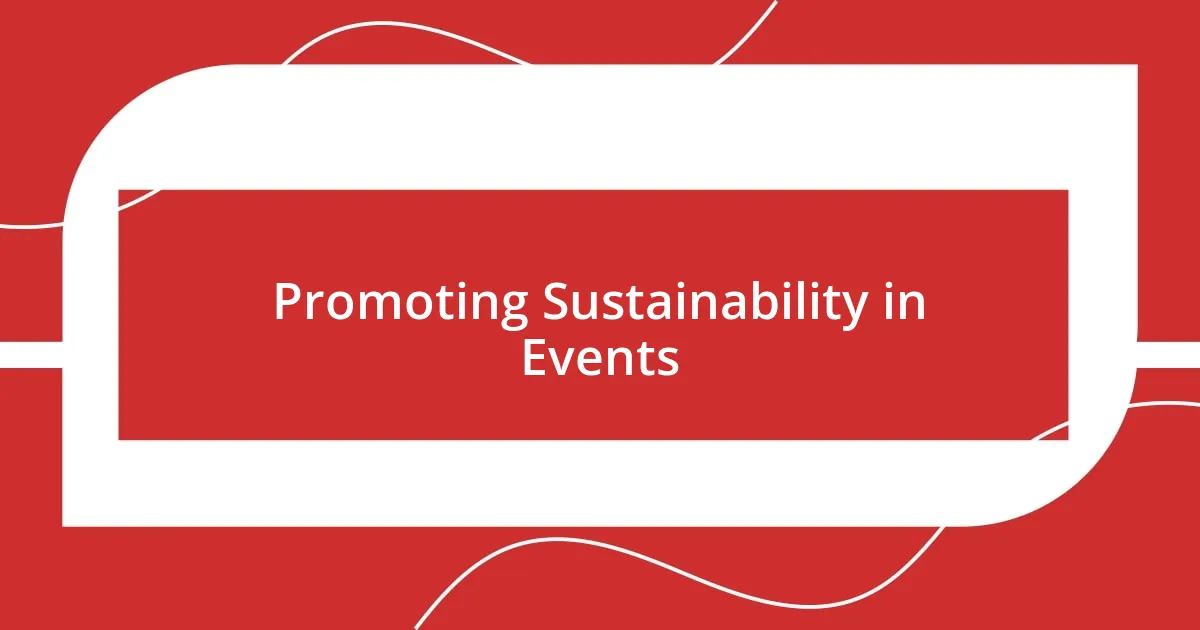
Promoting Sustainability in Events
Promoting sustainability in events requires a creative approach that goes beyond just the surface. During one event, we embraced digital invitations to eliminate paper waste entirely. I still remember the smiles on people’s faces as they admired our eco-conscious style. It really struck me how a small, thoughtful decision could contribute to a larger shift towards sustainability.
A memorable moment for me was introducing a recycling and composting station at one of our events. I watched as attendees browsed the bins, eager to discern what belonged where. It was enlightening to see people take such care in making responsible choices. Don’t you think it’s amazing how awareness can be transformed into action just by providing the right resources?
Moreover, I learned that incorporating sustainability messages into event programming can be influential. At an event focused on climate change, we invited speakers who shared passionate stories about their work in the field. Their narratives prompted deep conversations among participants, igniting a shared commitment to adopt eco-friendly practices in their own lives. I found that when we connect meaningful content with actionable insights, we can truly inspire others to champion sustainability long after the event has ended.










